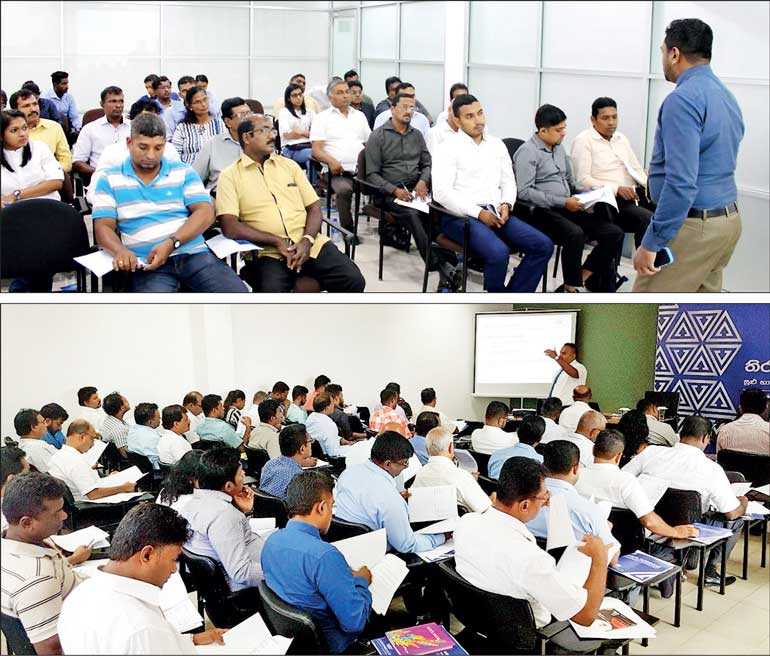Friday Feb 20, 2026
Friday Feb 20, 2026
Thursday, 12 March 2020 00:00 - - {{hitsCtrl.values.hits}}

By Jonathan Alles
It is well accepted that the Sri Lankan economy requires urgent course correction. GDP over the past three years has dropped to its lowest point in over a decade resulting in setbacks to development and an increased debt burden. Meanwhile, volatility in global markets has stifled the demand for traditional Sri Lankan exports, while Foreign Direct Investments have slowed to concerning levels.
Moving forward, stringent management of the budget deficit, combined strategic stimulus packages for key sectors in the economy and bold reforms that prioritise macroeconomic stability will be essential to any meaningful recovery.
Especially when considering the long term context of the country’s current economic trajectory, it is clear that we are at economic cross-roads. Structurally, our nation has continued its transition away from being an agri-centric economy, to one that is primarily driven by the services and industrial sectors, however, agriculture remains our nation’s largest source of employment and the lowest contributor to GDP.
Sri Lankan SMEs have still only scratched the surface
All of these dynamics are perhaps best reflected in the performance of the Small and Medium Enterprises (SMEs) – whose performance in many ways acts as a microcosm of national economic dynamics.
Currently, SMEs make up 75% of total enterprises in Sri Lanka and account for 52% of GDP and 45% of national employment. For nearly a century, the vast majority of the Sri Lankan SME sector were traditionally linked to agriculture, dairy and fisheries – either as producers, or partners in a supply chain which serves the requirements of larger corporate entities.
Only over the past decade has there been a notable shift in the composition of Sri Lankan SMEs towards hospitality, health, import/export and IT. Where the agriculture sector has been battered by extreme weather conditions over the recent past, the brightest spots during this same timeframe have primarily been from this next generation of Sri Lankan SMEs.
Especially when considering the disproportionate impact of technology in enhancing the competitive ability of such enterprises, it is imperative that our strategies are carefully aligned to ensure that our SMEs have access to the capital, infrastructure, knowledge and expertise necessary to grow into vibrant corporates.
Taking the example of India, where SMEs account for nearly 95% of total enterprises we can start to gain a clearer understanding of the unrealised potential still inherent in this sector.
When considered together with the radical new possibilities for expansion, networking and optimisation enabled through advancements in e-commerce, digital payments, and enterprise resource planning (ERP) systems, we can begin to conceptualise a vision of what the future will look like for the Sri Lankan economy. At the centre of this vision will be a new generation of digitally- empowered SMEs, competing locally and globally on a playing field that has never been more level.
Partnerships based on value, and built to last
Since inception HNB has been intrinsically linked to the development of the Sri Lankan SME sector – having been established in 1888 primarily to cater to small and medium enterprises in and around the country’s burgeoning plantation industry.
In the decades that followed, the bank grew and evolved in parallel with the sector - developing and refining our value proposition to encompass a wide array of products, services, and value additions designed to cater to clients at every level of the Sri Lankan economy.
Being recognised as the Best SME Bank in Sri Lanka by The Asian Banker as well as Asiamoney in 2019, we always take great pride in the value that HNB continues to provide to over 100,000 SMEs across the island. Our support for this sector has not been without its risks, however, the success we have achieved in establishing a pipeline of clientele that have become increasingly significant contributors to the national economy speaks to our expertise in this field.
Naturally, HNB’s support for the SME sector had been primarily focused on ensuring that successful businesses have access to the required capital to grow. However, our experience as the first private sector commercial bank to enter the SME space has taught us that funding alone is insufficient to guarantee the staying power of SMEs.
The vast majority of SME founders we have worked with have proven themselves to be innovative and hardworking in their fields. However, while their expertise in their chosen business is often extremely strong, their exposure to the administration of business itself tends to be lacking at times. Hence while their preliminary business model is viable, their ability to plan out their growth, track income and manage expenditure while adapting to compete at scale becomes a limiting factor.
When business is good, this is a challenge which may not be immediately evident. However, such enterprises typically find themselves tested when the commercial environment changes or when the business grows to the point where a single person is no longer capable of overseeing each aspect of it. As any seasoned business-owner knows all too well, planning for difficult times is part and parcel of any successful venture.
In the case of the agriculture sector, prolonged periods of extreme inclement weather deprived many of their produce and livelihood, creating a huge cash flow strain and hindering the ability of farmers and agri-based SMEs alike to repay debts.
Most recently, these dynamics came to a head in the post-April economic downturn when a substantial number of SMEs were faced with severe challenges in the aftermath. In the months that followed, economic activity reached a point of severe stagnation. Several SMEs which had previously been able to maintain strong profits were suddenly caught in a situation where they were inadequately capitalised and lacked the capacity to develop their businesses and drive sales.
While the tourism sector was hit hardest, the spill over effects spread out across related sectors, ultimately leading to a moratorium on debt – first to the tourism sector in May 2019, and followed by further moratoriums with loans of up to Rs. 300 million and revenues of up to Rs. 750 million from February 2020 for SMEs broadly.
Building internal resilience is better than providing external protection
Even prior to the announcement of these moratoriums, HNB had regularly taken steps wherever possible to assist business owners by restructuring debts or rescheduling payments. Together with the Government directives – many SMEs facing severe difficulties were provided another lifeline to work through these challenging conditions.
This was a positive development for many, however it is incumbent on us as leaders in the banking industry and pioneers in the SME space to reiterate that such policies can provide only a temporary measure of relief to these enterprises unless such benefits are used appropriately. Moreover, if not carefully managed and monitored, we run the risk of eroding the competitive ability of one of the most vital sectors to the national economy.
Given the uniquely difficult circumstances which led up to the debt moratorium, the fact that these enterprises are being provided affordable access to lines of funding to revive their businesses should ideally place them in a better position to commence repayment within the span of one year.
It is however essential that those availing themselves of these facilities always keep in mind that the funds they have gained access to as a result must be used cautiously and in a manner that actually strengthens their business and its resilience to unexpected external shocks. This is the only way in which they can extract themselves from difficulty and ensure that when the time comes to repay, that they are able to honour their commitments. Failure to do so will only create a culture of dependency, which is the exact opposite of the resilience which SMEs must urgently cultivate if they are to ensure their long-term survival and prosperity.
In that regard, we strongly urge business owners to think carefully about their next moves, and channel these funds into strategic purposes that add tangible value to their business while avoiding unnecessary expenditure into areas unrelated to their core business without at least testing and evaluating market conditions first.
Those enterprises which use this space to optimise their businesses and establish capital buffers against further external shocks, while enhancing their competitive ability and seeking out new markets – both locally and globally - will have proved themselves. Conversely, those enterprises that squander this vital opportunity will almost certainly find themselves in a worse position one year down the line if they neglect their business fundamentals and divert borrowed funds granted to their businesses into extravagant and irresponsible personal spending. Hence, while the moratorium brings a reprieve to some businesses, it also creates major opportunities for those willing and able to step-up and prove themselves.
Given the vital role of Sri Lankan SMEs in job and wealth creation, it is absolutely vital that these businesses are made to reach their fullest potential. Our end goal should not only be for such enterprises to grow locally, but also to compete internationally. The concerted efforts of all stakeholders will be necessary in this endeavour.
Evolving banking to establish a new paradigm in SME-led growth
As one of the four systematically important banks in Sri Lanka, HNB is fully committed to supporting our SME clients and the Government’s own vision to help such businesses grow in a decentralised manner, helping to spread economic prosperity to every corner of Sri Lanka. In this journey, HNB has always been unwavering in its commitment to serving as a partner in progress to the SME sector.
Moving forward we remain deeply committed to this mission, as we have seen first-hand the massive positive impact that SME development has on local communities all across the island.
It has been in that spirit – over and above supporting the financial needs of these enterprises – that HNB has continuously conducted SME capacity building programs. Working partnership with Government and international agencies including the Asian Development Bank and DEG we have enhanced the ability of SMEs to sustainably develop their businesses and enhance their financial literacy, human resource management, while resolving business challenges, ensuring compliance with best practices in governance, raise visibility and improve supply chain management.
Digitisation of our SMEs is another vital component of our strategy. From providing a window for SMEs to participate in the digital payment ecosystem through products like HNB MOMO and SOLO to introducing them to ERP systems that help them to optimise supply chain management, and establishing links to local and global customers through digital platforms, we have sought to provide them a new marketplace to showcase their goods to the rest of Sri Lanka and the world. Additionally, HNB also continues to partner with the Export Development Board of Sri Lanka in order to provide specialised lines of credit for SMEs seeking to compete in export markets.
Internally, we have also restructured operations in order to optimise capacity across HNB’s extensive branch network, in order to provide SMEs with the convenience of dealing directly with their local HNB branch and our regional SME Banking Managers. We are confident that each of these pioneering, grassroots-focused initiatives will yield rich rewards to those SMEs that are committed to achieving their fullest potential. HNB stands firmly behind such enterprises, and we will continue to lend our support to them in pursuit of our common vision for an economically and socially prosperous nation.
The writer is the Managing Director/CEO of HNB